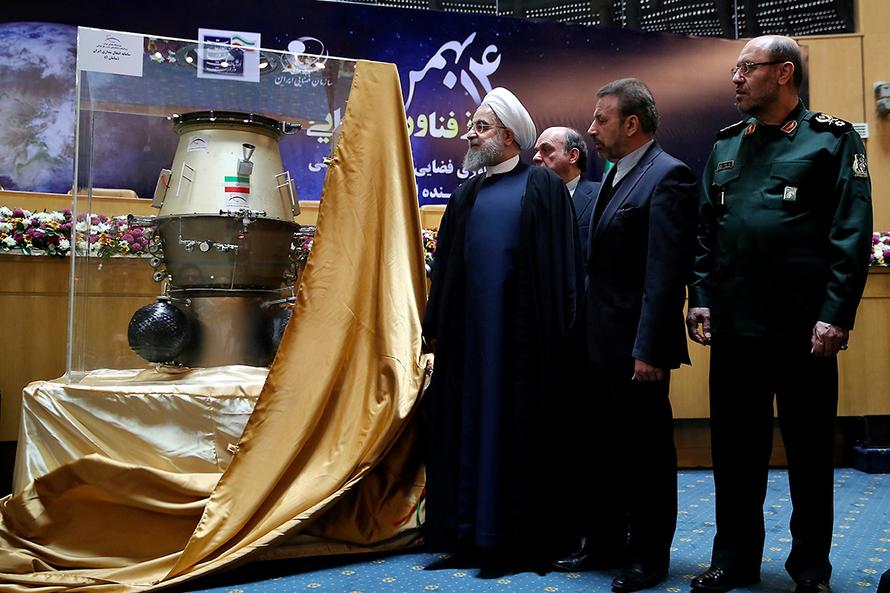Thanks to another felonious leak of classified information to the New York Times, we now know that the Trump administration has accelerated a secret American program aimed at sabotaging Iran’s missiles and rockets by sabotaging their supply chain with faulty components, “according to current and former administration officials.”

The success of the effort is unknown, however the Times suggests that Iran’s two recent satellite launch failures “within minutes” may be due to the previously undisclosed program.
Those two rocket failures — one that Iran announced on Jan. 15 and the other, an unacknowledged attempt, on Feb. 5 — were part of a pattern over the past 11 years. In that time, 67 percent of Iranian orbital launches have failed, an astonishingly high number compared to a 5 percent failure rate worldwide for similar space launches.
The setbacks have not deterred Iran. This week, President Hassan Rouhani singled out Tehran’s missile fleets as he vowed to “continue our path and our military power.” –New York Times
The United States has accused Iran of using their space program as a guise to develop ballistic missiles powerful enough to travel between continents. Hours after Iran’s failed January launch, Secretary of State Mike Pompeo said that Iran’s satellite launchers contain technology which is “virtually identical and interchangeable with those used in ballistic missiles.”
Leading a meeting of 65 nations this week in Warsaw alongside Vice President Mike Pence, Pompeo sought to encourage Middle East stability – including “by expanding economic sanctions against Iran,” according to the Times, which adds that the meeting was “largely an appeal to European allies who, while continuing to oppose President Trump’s decision to abandon the 2015 nuclear accord with Iran, also agree that the missile tests must stop.”
Following the launch failures, the Times reached out to over a half-dozen current and former government officials who have participated in the sabotage program for more than a decade.
“The covert actions against Iran’s missile and rocket program are being taken through countries and companies that supply Tehran’s aerospace operations,” writes the Times.
The officials described a far-reaching effort, created under President George W. Bush, to slip faulty parts and materials into Iran’s aerospace supply chains. The program was active early in the Obama administration, but had eased by 2017, when Mr. Pompeo took over as the director of the C.I.A. and injected it with new resources.
Tehran is already suspicious. Even before Mr. Trump withdrew last May from the nuclear accord, Brig. Gen. Amir Ali Hajizadeh, the head of Iran’s missile program, accused American and allied intelligence agencies of turning their campaigns of “infiltration and sabotage” to Iran’s missile complex from its atomic infrastructure. –New York Times
In 2010, meanwhile, a sophisticated malicious computer virus known as Stuxnet – thought to be a jointly built American / Israeli cyber-weapon, targeted Iranian centrifuge systems, causing them to tear themselves apart.
Thanks to UN sanctions on Iran, Tehran has been forced to rely increasingly on black markets and shadowy middlemen – which have been compromised by the CIA – resulting in the faulty components being slipped into the supply chain.
Under President Obama, faulty parts were provided not only for missiles, but also satellite launch components.
According to the Times, however, some rocket specialists have challenged the notion that the sabotage of Iran’s missile program also affected their space program, as “whatever overlap exists is too small to be significant.”
Despite Iran dismantling its centrifuges under the 2015 nuclear agreement, and shipping 97% of its nuclear fuel to Russia, the Islamic Republic has reportedly ramped up its missile and space program. This is where Pompeo and the CIA stepped in, immediately focusing on the supply chain for rockets and missiles.
He had graduated from West Point with a degree in mechanical engineering and founded, with classmates, Thayer Aerospace, named for a famous superintendent of the military academy. The company made parts for Boeing, Lockheed and Raytheon. Mr. Pompeo understood what happens when aerospace parts are produced with less than extreme precision. From 2011 to 2017, he served in Congress, including on the House Intelligence Committee.
When he got to the C.I.A., he pressed to reinvigorate the sabotage program. It was, a former official said, an obvious target. -New York Times
The clandestine effort to “seed” Iran’s aerospace program with faulty components can take years – while knowing whether said components were actually used in the construction of rockets and missiles is virtually impossible.
In one instance, the United States got lucky: “A short-range Iranian-made missile landed in Baghdad’s Green Zone, but failed to detonate. When experts pulled it apart, they found one of the American-sabotaged parts inside, according to a former senior official.”
Complicating efforts to assess the sabotage program is Iran’s size and proximity. Around twice the size of Texas, missile components typically fall into its own territory – unlike North Korea, whose missile launches are relatively easy to monitor given its proximity to American bases, fleets, radars and allies.
With Iran, the evidence is not so easy.
At least once, an Iranian rocket exploded on the launchpad, leaving damage so extensive that satellites passing overhead could make out blast scars, burned wreckage and a blackened rocket transporter. Iranian officials kept silent on that disaster, in 2012. -New York Times
According to sky monitors, Iran’s latest failures have been easy to track. The country has failed to successfully test their latest generation satellite launcher – a much more powerful, nine-story-tall rocket known as Signorgh which left the ground intact but suffered a failure in its third stage.
“Sometimes life does not go as expected,” said Iran’s minister of telecommunications, Mohammad Javad Azari Jahromi.
And sometimes that’s because the United States slipped faulty components into your rockets, according to the New York Times.






